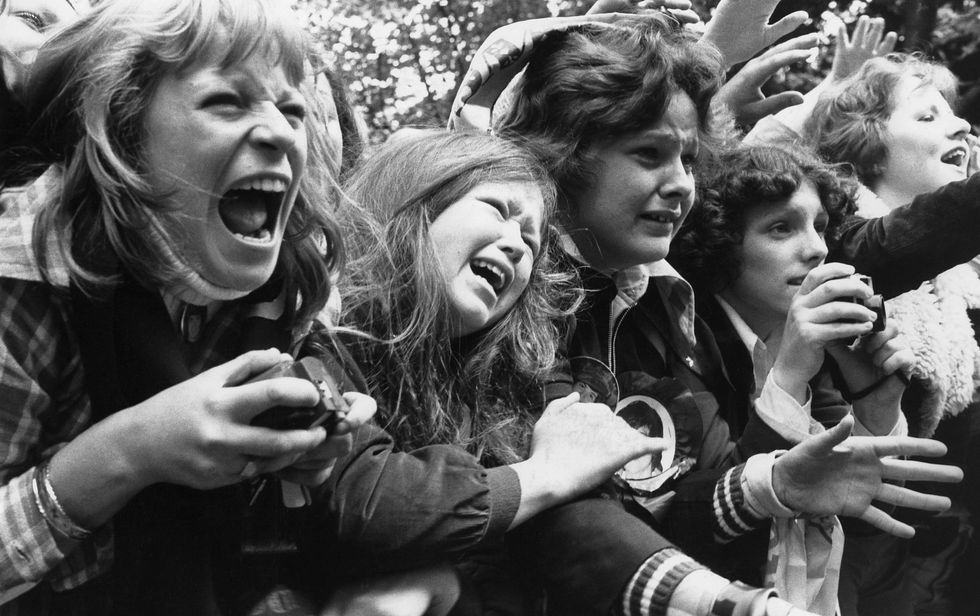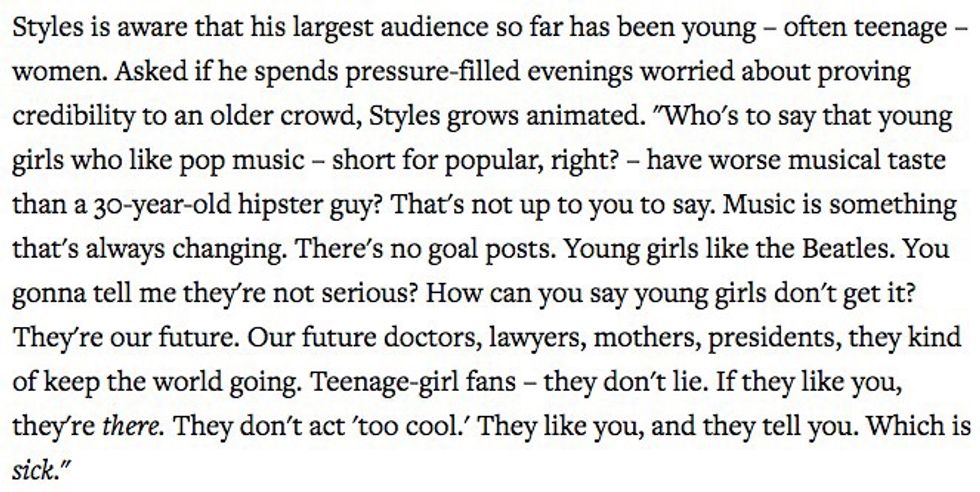There is, and always has been, a stigma around young girls and the things they love. From Beatlemania to the rise of the Twilight paranormal era, young girls who feel impassioned about new pop culture icons are seen in society as fanatical and obsessed. Moreover, in intimate social circles like schools, girls who love more passionately than others are often seen as geeky and weird and crazed.
I myself was always scared of being seen as too passionate and earning demeaning and dismissive labels like “loser” and “nerd," viewing those as somewhat of a scarlet letter. I remember one time, I was passionately talking about a book and my brother told me I was obsessive. I immediately went on the defensive, yelling and shouting and banning him from ever calling me that again.
As I made closer and better friends during my formidable middle and high school years, I began opening up more about the things I was interested in. When my friends and I found our middle ground, we would tailspin out into a la la land of ourselves.
For example, we learned every fact about Panic! At the Disco, every lyric to every song, bought merchandise, talked about it extensively. I even got a homemade Brendon Urie cut out for my birthday one year, and he was a staple in my life for a while. There was something so magical in talking about something with reckless passion with people that just seemed to get it.
But I never talked about this outside of my friend group.
I wasn’t so much worried that liking Panic! specifically would prompt others outside of my circle to make fun of me, but that liking something with this intensity would. I think, in analyzing the influence of The Beatles in the 60’s and looking at the modern era of pop music post-One Direction (let’s be real: this hiatus is permanent and we are post-1D), I misjudged a lot of girls my age.
I convinced myself that because no one else was talking about their interests with a fervent passion that no one had fervent passions, not recognizing at all my personal predicament. I think now that the most harmful consequence of this stigma is that it puts up walls between young girls and promotes a toxic environment where people are ashamed to be themselves.
This summer, however, I both watched and engaged in so many conversations where people were not scared of sharing their interests proudly and passionately. I had the privilege of working as an editorial intern for a children’s and YA imprint which prompted me to read contemporary YA literature prior to starting and all throughout the summer to get a sense of what teens are reading now.
Between looking up what books people were getting excited about on sites like Tumblr and having in-depth fawning conversations with my coworkers, I started to become more comfortable with talking about my interests more openly.
The people I worked with literally make a living out of getting passionate about stories they read and hoping others will be passionate about them too. I had countless conversations that started calmly until someone said, “Well I’m a really big fan of…” and then we would spiral out until we were whisper-shouting, “YES!!! That’s exactly what I thought/felt/hoped for!!!”
We talked about how much better the Netflix Marvel shows are than the Marvel movies, and where to find hilarious fan reviews books and shows, and how my first experience with a fandom was when I was 12 and wrote One Direction fan fiction for my friends.
There was no judgment or sense of superiority over who liked what and to what degree they liked it; we just talked. While my internship gave me incredible hands on experience in the industry I want to pursue, it also provided invaluable life lessons that I’m not sure I would have learned anywhere else.
Right before the end of this past school year, Harry Styles did an interview with Rolling Stone that included this quote:
It struck an odd chord in me because through articles and interviews and every single episode of Big Time Rush I’ve encountered where young female fans are being seen as unhinged and consumed with desire, I had begun to see the things I loved as something to tone down or else be ashamed of.
And now here was someone, who happened to be a part of my “obsession," telling me my interests were valid, my support was respected, my nature was not uncouth. Coupled with the conversations with my coworkers, I began to mentally paint myself, my loves, and my fellow fangirls in a new light.
Our passions and interests, regardless of what they are or how strongly we feel them, are not to be discouraged by what we perceive or how we are perceived. None of it makes us better than one another, nor does it make us any less of a respectable individual in society; our passions, our "obsessions," are just what makes us us.
















